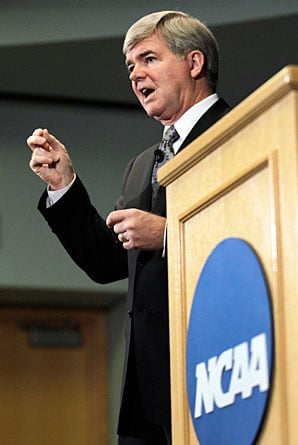
With Senator Jake Corman and Treasurer Rob McCord’s lawsuit against the NCAA now in the discovery phase, emails have been uncovered, which are very embarrassing to the NCAA. It now appears that NCAA officials privately acknowledged in internal emails that the NCAA did not have the authority to sanction Penn State. This conclusion is not at all surprising, given the fact that the university had not broken any NCAA rules, and in the past, criminal matters had always been handled exclusively by the criminal justice system.
Yet the NCAA’s internal discussions were very different from the public pronouncements of NCAA President Mark Emmert, who stated in the summer of 2012 that the NCAA not only had the authority to take action against Penn State, but that even the death penalty was an option. Emmert claimed that the circumstances were so egregious, that prior precedents did not apply, and apparently the NCAA’s bylaws could simply be disregarded as well. Former Penn State President Rodney Erickson has stated that he was essentially forced into accepting the controversial “Consent Decree,” because the only other alternative would have been a multi-year death penalty for Penn State football. But it turns out that the NCAA was just “bluffing” Dr. Erickson, because NCAA officials knew all along that they could not legally make up new rules as they go along, or at least that is unless they could convince Penn State to “agree” to draconian sanctions.
The media seems to have missed a very important question in its coverage of the Corman and McCord lawsuit against the NCAA, and that question is whether the conduct of NCAA officials crossed the line into criminal conduct. It is quite possible that certain NCAA officials may be investigated for and ultimately charged with theft by extortion pursuant to section 3923 of the Pennsylvania Crimes Code. NCAA officials would be guilty of theft by extortion if they obtained or withheld property from Penn State by threatening to “take or withhold action as an official, or cause an official to take or withhold action,” unless the threat was made in the honest pursuit of lawfully owed restitution or indemnification of harm. In simplified terms, if the NCAA had a legal right to impose sanctions against Penn State pursuant to the organization’s bylaws, then NCAA officials did not commit the crime of theft by extortion. They were simply negotiating with Penn State in a completely lawful manner. If on the other hand, the NCAA threatened to take official actions, such as imposing the death penalty or some other sanctions, and the NCAA had no legal authority to impose such sanctions, then I don’t see how this is anything but theft by extortion. Not only is it theft by extortion, it amounts to a first degree felony, because the amount of money extorted exceeds $500,000.
In addition to the charge of theft by extortion, NCAA officials could also potentially be charged with conspiracy to commit theft by extortion. A criminal conspiracy is an agreement between two people or among three or more people to commit a crime, with some overt action taken in furtherance of the crime. In this case, the allegation would be that NCAA officials worked together to commit the crime of theft by extortion, which would amount to an additional first degree felony.
A first decree felony in Pennsylvania is punishable by a maximum sentence of 10 to 20 years of incarceration and a fine not to exceed $25,000. If NCAA officials are convicted of both theft by extortion and conspiracy to commit theft by extortion, they face possible aggregate sentences of 20 to 40 years. I assume that none of the potential NCAA criminal defendants have a prior record, so they should not expect to face anything near the maximum possible sentences. The sentencing guidelines call for anywhere between nine to 16 months incarceration, which would either be a “long county jail” sentence or a “short state prison” sentence. That being said, if any NCAA officials are convicted, I would not be surprised to see “aggravated range sentences” of more than 16 months, as the amount of money extorted amounts to $60 million in fine money, plus millions of dollars in lost bowl revenue.
If any members of the Emmert Gang are charged, they may or may not be in a position to mount a defense. It will really depend upon the contents of emails, most of which have yet to be released. Possible defenses would be that the NCAA did in fact have authority to impose sanctions and/ or that D. Erickson was never threatened with the death penalty or any other sanctions. The first argument would be very difficult to make, given the plain language of the NCAA bylaws. The second argument would require a jury to believe that Dr. Erickson is lying about the death penalty threat. In short, any defenses mounted by the NCAA at trial would likely be some version of the “Chewbacca defense.” As things stand right now, certain NCAA officials look pretty damn guilty, but then again, my opinion could change as new evidence emerges.
Ultimately, Pennsylvania Attorney General Kathleen Kane will have to decide whether criminal charges are warranted against any NCAA officials, and I am sure she will make such an important decision only after conducting a very thorough investigation. She is not going to want to file criminal charges is such a high profile case unless she is absolutely sure she can get convictions. I highly doubt she will be in a position to make any type of decision until after the Corman and McCord versus NCAA civil trial in early January, 2015. I just hope that Attorney General Kane has already assembled a team of some of her best prosecutors and agents to begin an investigation.
Matt McClenahen is a criminal defense lawyer in State College, Pennsylvania, home of Penn State University. He is a Penn State alumnus and proud Penn State football season ticket holder.

